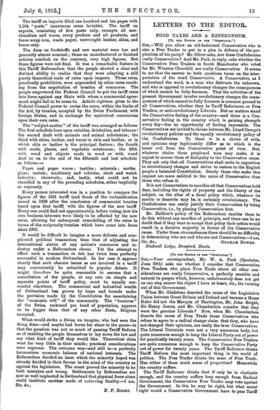LETTERS TO THE EDITOR.
FOOD TAXES AND A REFERENDUM.
[To TEl EDITOR 01 THR SPICTATOR.1 Sra,—Will you allow an old-fashioned Conservative who is also a Free Trader to put in a plea in defence of the per- plexities of his party P Mr. Oliver asks, Are these Confederates really Conservative ? And Mr. Peck, in reply, asks whether the Conservative Free Traders in South Manchester who voted for Mr. Winston Churchill are really Conservative. It seems to me that the answer to both questions turns on the inter- pretation of the word Conservative. A Conservative, as I understand the word, is a man who distrusts the unknown, and who is opposed to revolutionary changes the consequences of which cannot be fully foreseen. That the activities of the present Government involve revolutionary changes the conse- quences of which cannot be fully foreseen is common ground to all Conservatives, whether they be Tariff Reformers, or Free Traders, or anti-revolutionary Liberals. But as matters stand the Conservative feeling of the country—and there is a Con- servative feeling in the country which is gaining strength every day—has no opportunity of finding ex-pressiOn. The Conservatives are invited to choose between Mr. Lloyd George's revolutionary policies and the equally revolutionary policy of the Confederates. To them it is a choice of evils, and opinions may legitimately differ as to which is the lesser evil from the Conservative point of view. But, whatever choice these perplexed men may make, it is unjust to accuse them of disloyalty to the Conservative cause. They ask only that all Conservatives shall unite in opposition to revolutionary changes and strive to restore to the English people a balanced Constitution. Surely those who make this request are more entitled to the name of Conservative than those who refuse it.
It is not Conservatism to sacrifice all that Conservatives hold dear, including the rights of property and the liberty of the subject, on the altar of a fiscal policy which, whatever its merits or demerits may be, is certainly revolutionary. The Confederates can easily justify their Conservatism by being Conservative, i.e., by placing Conservatism first.
Mr. Balfour's policy of the Referendum enables them to do this without any sacrifice of principle, and there can be no doubt that if they were to accept that policy their action would result in a decisive majority in favour of the Conservative cause. Under these circumstances there should be no difficulty in determining who are and who are not Conservatives.—I am,
Sir, &c., GRAHAM Bo WER. Studwell Lodge, Droxford, Hants.


















































 Previous page
Previous page